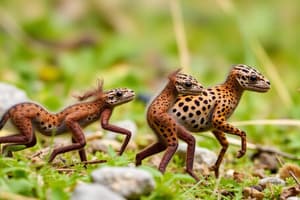Podcast
Questions and Answers
Which of the following is NOT part of the biological species concept?
Which of the following is NOT part of the biological species concept?
- Populations whose members can potentially interbreed, under natural conditions.
- Populations whose members are reproductively isolated from other such groups.
- Populations whose members can interbreed and produce fertile offspring.
- Populations that share similar morphological features. (correct)
What is the primary difference between a paleontological species and a biological species?
What is the primary difference between a paleontological species and a biological species?
- Paleontological species are based on fossil evidence while biological species are based on living organisms.
- Paleontological species are based on morphology while biological species are based on genetic similarities. (correct)
- Paleontological species are defined by their ability to interbreed while biological species are defined by their shared ancestry.
- Paleontological species are extinct while biological species are currently living.
Which of the following is an example of an atavistic organ?
Which of the following is an example of an atavistic organ?
- The presence of teeth in a chicken (correct)
- The appendix in humans
- The wings of a penguin
- The tailbone in humans
What is convergent evolution?
What is convergent evolution?
Which of the following is an example of analogous structures?
Which of the following is an example of analogous structures?
Which of the following is considered the basic level on which macroevolutionary processes operate?
Which of the following is considered the basic level on which macroevolutionary processes operate?
What is the primary mechanism driving speciation?
What is the primary mechanism driving speciation?
Which of the following Domains does NOT include organisms considered to be part of the Kingdom Animalia?
Which of the following Domains does NOT include organisms considered to be part of the Kingdom Animalia?
What do homologous structures in different vertebrates indicate?
What do homologous structures in different vertebrates indicate?
What distinguishes analogous structures from homologous structures?
What distinguishes analogous structures from homologous structures?
Which animal is identified as the primary ancestor of the coywolf?
Which animal is identified as the primary ancestor of the coywolf?
What genetic trait contributes to the small size of certain dog breeds?
What genetic trait contributes to the small size of certain dog breeds?
Which of the following is NOT an example of artificial selection in plants?
Which of the following is NOT an example of artificial selection in plants?
What feature of bush dogs aids them in swimming?
What feature of bush dogs aids them in swimming?
Which statement about the genetic relationship of bush dogs is accurate?
Which statement about the genetic relationship of bush dogs is accurate?
What is the primary reason for the development of small dog breeds like Pomeranians and Chihuahuas according to researchers?
What is the primary reason for the development of small dog breeds like Pomeranians and Chihuahuas according to researchers?
What is the process called when two species evolve together due to genetic changes in one species selecting for adaptations in another?
What is the process called when two species evolve together due to genetic changes in one species selecting for adaptations in another?
What term describes the evolutionary change in the rate or timing of developmental events within an organism?
What term describes the evolutionary change in the rate or timing of developmental events within an organism?
Which of the following best describes punctuated equilibrium in evolutionary biology?
Which of the following best describes punctuated equilibrium in evolutionary biology?
Parapatric speciation involves which of the following scenarios?
Parapatric speciation involves which of the following scenarios?
Which type of speciation results from genetic divergence due to physical barriers interrupting gene flow?
Which type of speciation results from genetic divergence due to physical barriers interrupting gene flow?
What concept is considered the most specific and scientifically useful in biological classification?
What concept is considered the most specific and scientifically useful in biological classification?
Which of the following statements differentiates sympatric speciation from other types?
Which of the following statements differentiates sympatric speciation from other types?
Which of the following traits is NOT characteristic of phyletic gradualism?
Which of the following traits is NOT characteristic of phyletic gradualism?
Flashcards
Coevolution
Coevolution
A process where two species evolve together, with adaptations in one species selecting for changes in the other.
Heterochrony
Heterochrony
An evolutionary change in the rate or timing of developmental events.
Punctuated Equilibrium
Punctuated Equilibrium
The evolutionary theory that suggests species evolve rapidly and then remain relatively stable for long periods.
Phyletic Gradualism
Phyletic Gradualism
Signup and view all the flashcards
Parapatric Speciation
Parapatric Speciation
Signup and view all the flashcards
Sympatric Speciation
Sympatric Speciation
Signup and view all the flashcards
Dispersal
Dispersal
Signup and view all the flashcards
Vicariance
Vicariance
Signup and view all the flashcards
What defines a species?
What defines a species?
Signup and view all the flashcards
Paleontological Species
Paleontological Species
Signup and view all the flashcards
Speciation
Speciation
Signup and view all the flashcards
Biological Species Concept
Biological Species Concept
Signup and view all the flashcards
Vestigial Organs
Vestigial Organs
Signup and view all the flashcards
Atavistic Organs
Atavistic Organs
Signup and view all the flashcards
Convergent Evolution
Convergent Evolution
Signup and view all the flashcards
Analogous Structures
Analogous Structures
Signup and view all the flashcards
Homologous Structures
Homologous Structures
Signup and view all the flashcards
Coywolf
Coywolf
Signup and view all the flashcards
Bush Dog
Bush Dog
Signup and view all the flashcards
Small Dog Size
Small Dog Size
Signup and view all the flashcards
Artificial Selection in Plants
Artificial Selection in Plants
Signup and view all the flashcards
Wild Mustard
Wild Mustard
Signup and view all the flashcards
Cauliflower
Cauliflower
Signup and view all the flashcards
Study Notes
Species Interactions and Coevolution
- Adaptations in one species can drive adaptations in another, creating a feedback loop.
- This reciprocal evolutionary change is called coevolution.
Evolutionary Effects of Development Genes
- Developmental genes control the rate, timing, and pattern of organismal development.
- Changes in these genes can lead to significant changes in body form.
Changes in Rate and Timing
- Heterochrony is an evolutionary change in the rate or timing of developmental events.
- Differences in the relative growth rates of parts of the body, lead to the contrasting shapes of human and chimpanzee skulls.
Speciation Rates- Punctuated Equilibrium vs. Gradualism
- Punctuated equilibrium: Long periods of little change punctuated by short bursts of rapid evolutionary change.
- Gradualism: Gradual, steady change over long periods.
- These are two contrasting models for how speciation occurs.
Speciation Processes and Rates
- Punctuated equilibrium:
- Sexually reproducing populations experience long periods of little change.
- Rapid bursts of branching speciation (cladogenesis) are localized and rare events.
- Phyletic gradualism:
- Evolution occurs steadily along a lineage (anagenesis).
Parapatric Speciation
- Part of a population enters a new habitat bordering the range of the parent species.
- The border group develops unique traits.
- Hybrids form between the populations
- A common example is the Little greenbul of Cameroon (different populations developing traits in different environments).
Sympatric Speciation
- Populations diverge genetically within the same geographic area.
- Cichlids of Cameroon and Lake Ejagham are an example.
- Populations adapt differently to varying microenvironments.
- Example is that of cichlids in different environments of Cameroon populations and Lake Ejagham.
- A change in ecological strategy can result in speciation.
Allopatric Speciation
- Geographic isolation creates separate populations that diverge genetically over time.
- Dispersal, and vicariance are the two main ways populations can be isolated geographically.
- Over time, separate populations evolve significant differences and can no longer interbreed.
Biological Species Concept
- A group of populations whose members can interbreed to produce fertile offspring.
- Members of the same species can interbreed, or have the potential to interbreed.
- Speciation occurs when breeding becomes impossible.
Macroevolution and Microevolution
- Microevolution is the change in allele frequencies within a population.
- Microevolution has a key role in macroevolution , driving the evolution of new species.
Evidence of Biological Evolution and Natural Selection
- Anatomical Record:
- Homologous structures are similar in structure, share evolutionary origin, but not necessarily in function (e.g., forelimbs of mammals).
- Analogous structures have similar functions,but do not share evolutionary origins (e.g., wings of birds and insects).
- Vestigial structures are reduced or diminished structures that had important functions in an ancestor.
Convergent Evolution
- Organisms that are not closely related develop similar characteristics due to similar environmental pressures.
Artificial Selection in Plants
- Humans have selected for desirable traits in plants such as broccoli, cabbage, kale and Brussels sprouts.
Coyotes, Wolves, and Dogs
- New DNA research indicates that eastern coyotes are a mixture of coyote, wolf, and dog genes, not a distinct species.
- Genetic variation exists in coyote populations.
Bush Dog
- The bush dog is a canine found in Central and South America.
- It's evolutionarily closer related to the maned wolf, than the African wild dog or other related species.
- The bush dog evolved partially-webbed toes, to facilitate aquatic foraging.
Dog Domestication
- Findings indicate the origin of a small dog type before domestication emerged from a wolf populations, and not as a result of human-selected preferences for small breeds.
- Genetic mutations influencing body size are evident in early wolf ancestors.
The Organization of Life
- The Linnaean taxonomy (Domain, Kingdom, Phylum, Class, Order, Family, Genus, Species) groups organisms by shared characteristics and evolutionary relationships.
- A paleontological species uses morphology to define species instead of interbreeding criteria.
Studying That Suits You
Use AI to generate personalized quizzes and flashcards to suit your learning preferences.




